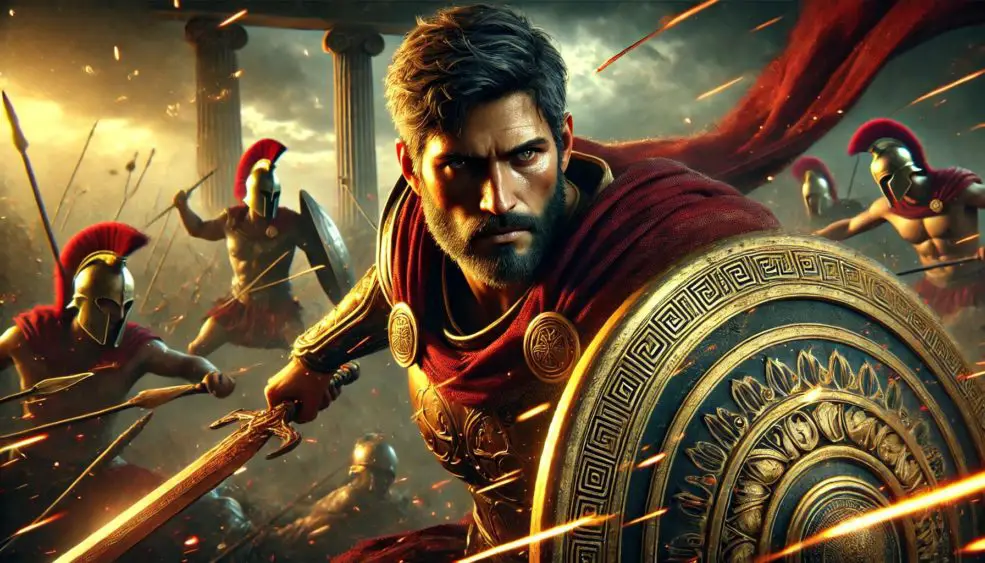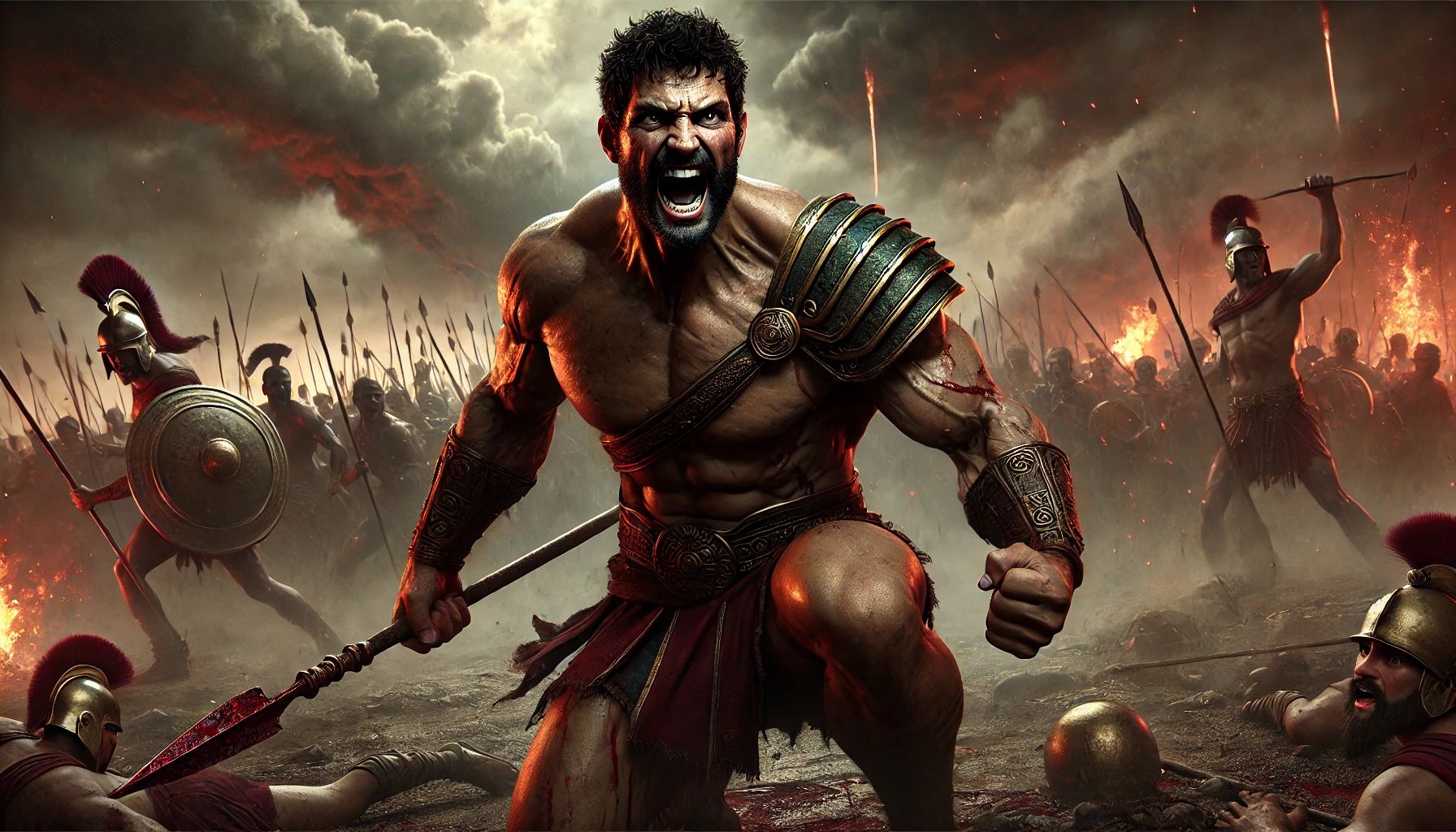Ares: Greek God Of War, Son Of Zeus And Hera, Olympian Deity
If you think about the Greek gods, they seem like powerful, unique individuals in their own ways. Among these gods, Ares is the one who stands out because he’s all about war. Think of a strong soldier whose only aim is finding joy and anger in the fight – that’s Ares.
Key Points:
- Ares, the Greek god of war, is a son of Zeus and Hera, with siblings like Athena and Apollo.
- His symbols include a spear, helmet, and vulture, which point to his role as a warrior and his association with death.
- Ares had a tricky love affair with Aphrodite, leading to several children, including Phobos and Deimos.
- He played a major part in the Trojan War, siding with the Trojans and clashing with other gods, like Athena.
- Ares was often at odds with other gods due to his aggressive and impulsive nature.
- Ancient Greeks worshipped Ares at various temples and through festivals, such as the Areia.
- Old writings, like Homer’s Iliad and Hesiod’s Theogony, describe Ares as a wild, forceful god of war.
His parents are Zeus and Hera, who are the king and queen of the gods, so Ares has a critical, though often debated, spot in Greek stories. In this blog post, we’ll look into the life and tales of Ares, starting from his beginnings and connections to his symbols, plus the many stories that talk about how he fits into ancient Greek culture.
Whether you’re just getting into these myths or you want to understand more, this full guide will give you a clear, and interesting look at Ares, the Olympian god of war.
Ares: Overview and Key Facts
| Key Fact | Description |
|---|---|
| Name | Ares |
| Area | War, violence, and bloodshed |
| Parents | Zeus (father) and Hera (mother) |
| Siblings | Athena, Apollo, Artemis, Hermes, Dionysus, Hephaestus, and others |
| Symbols | Spear, helmet, dog, vulture, chariot |
| Roman Equivalent | Mars |
| Partner | Aphrodite |
| Children | Phobos (fear), Deimos (terror), Harmonia, Eros, and others |
| Big Stories | Trojan War, affair with Aphrodite, conflicts with Athena and other gods |
| Prayer Places | Temples in Sparta, Thrace, and other regions; with related festivals and rituals |
| Qualities | Aggressive, fierce, impulsive, often disliked by other gods and mortals |
| Pictures in Art | Often appear as a handsome, muscular warrior in armor, sometimes with a shield and spear |
Ares’ Background and Family
To really get Ares, it’s important we talk about his beginnings and family ties with other gods up on Mount Olympus. Let’s dig into how Ares ended up being and his relationships with his godly brothers and sisters.
How Ares Came to Be
Ares, the god of fights, is the son of Zeus, the king of the gods, and Hera, the queen of the gods, which made him a well-known figure in the order of Mount Olympus. Think of a royal family where everyone has a special job; Ares’ job was to reflect the wild parts of battles.
His birth was important because it added another powerful god to the already complex group of Greek gods. As the child of two of the most powerful Olympians, Ares was always going to have an important, though often argued about, spot among the gods. He often clashed with his siblings and other gods because he was so aggressive.
Ares, the god of fights, had a crucial role in the Olympian family due to being born from Zeus and Hera, adding a powerful and contentious figure to the already complex group of Greek gods, frequently conflicting with his family and other deities due to his aggressive nature.
Siblings and Relationships
Ares was part of a big and well-known family, with many siblings. Some of his siblings were Athena, the goddess of wisdom and smart fighting; Apollo, the god of the sun, music, and future-telling; Artemis, the goddess of hunting and the moon; Hermes, the messenger god; Dionysus, the god of wine and parties; and Hephaestus, the god of blacksmiths and fire.

Think of a big family where each person is good at something different; that was how the Olympian gods were. Ares often had problems with Athena, who planned battles smartly, which was very different from Ares’ wild and rough style. It means their fights showed the bigger problem between using pure strength and being strategic.
Though Ares had these fights, he also had friends in his divine family. He was close to Aphrodite, the goddess of love. They had a known and strong relationship. Together, they had kids, like Phobos (fear) and Deimos (terror), who went with Ares into fights. He also had a tricky relationship with his brother Hephaestus, who caught Ares and Aphrodite in an embarrassing trap once. Here is a list of Ares’ main siblings:
- Athena
- Apollo
- Artemis
- Hermes
- Dionysus
- Hephaestus
These relationships show the tangled web of friends and fights that shaped Ares’ role and actions in the group of Greek gods.
What Ares Looks Like and His Symbols
To understand Ares’ identity, it’s really important to see how he is described in old art and writings, and the symbols that are closely linked to him.
Ares’ Appearance in Art and Stories
In old art and stories, Ares is often shown as a powerful and intimidating figure who is the perfect example of a warrior. Imagine a modern-day soldier in full battle gear. Ares is often pictured with a shiny helmet, a breastplate, and carrying a spear or sword, ready for combat.

His physical looks are those of an ideal warrior: muscular, strong, and often in the prime of his youth. In many pictures, he appears with a fierce expression, which means he has an aggressive and warlike nature. Whether in sculptures, vase paintings, or literary descriptions, Ares is always shown as the symbol of fighting skill and the harsh realities of war.
Things Linked to Ares
There are some things linked to Ares that point out his character as a warrior and his fierce nature. Among these are:
- Spear: Like a modern soldier’s rifle, the spear means Ares is always ready for battle and is known as a warrior god.
- Helmet: The helmet means protection and being ready for a fight, essential for any warrior going into battle.
- Dog: Seen in wars, the dog means loyalty and ferocity, which fit well with Ares’ character.
- Vulture: This bird is linked to Ares because it is associated with death and what happens after battles, reflecting his connection to the harsh realities of war.
These things together make a clear picture of Ares as the god of war and conflict, with each part helping to shape his identity.
Stories and Tales About Ares
To really get Ares, it’s important to look into the stories and tales that describe his actions and relationships with other gods and mortals.
Ares in the Trojan War
Ares had a big part in the Trojan War, which was a big fight between Troy and the Greek states. As the god of war, of course, he moved towards the battlefield and sided with the Trojans. Imagine a star player in a sports game who can change the match. Ares’ part in the war was a big deal.
He fought hard with the Trojan warriors and was a sign of the chaos and blood of fights. Whenever he was on the battlefield, it helped the Trojans feel better and scared the Greeks. Ares’ talks with other gods in the Trojan War were just as exciting.
He often went against Athena, the goddess of wisdom and planning in war, who supported the Greeks. Their fights showed their different views on war: Ares’ brute force against Athena’s smart plans. In one famous event, Athena helped the Greek hero Diomedes hurt Ares, who then had to leave the fight.

This event showed that Ares’ raw power was not always enough when smart thinking and godly help were involved. Besides his fights with Athena, Ares also had talks with other gods and people that changed the war. For example, he was once beaten by the Greek hero Heracles in another story, which affected how the Greeks saw him.
Even though he was very strong, Ares’ quick and impulsive actions sometimes led to problems for him and the Trojans. His part in the Trojan War shows the ups and downs and the unpredictability of warfare, where even the strongest gods could face setbacks.
Ares and Aphrodite’s Romance
The love story between Ares, the god of war, and Aphrodite, the goddess of love and beauty, is one of the most interesting tales in Greek mythology. Their relationship was really intense and secret, like a hidden love story in a modern TV drama.
Even though Aphrodite was married to Hephaestus, the god of blacksmiths and craftsmanship, she and Ares were super drawn to each other. Their secret meetings were full of the intensity and fervor you’d expect from the mix of war and love, two strong and often clashing forces. The most well-known story about their love story is about how they got caught by Hephaestus.
Given that he knew his wife was cheating, Hephaestus made a tricky and hard-to-see net to catch the lovers in the act. When Ares and Aphrodite were stuck, Hephaestus called the other gods to see their shame.
This part is like a scene from reality TV, where a secret love affair gets shown to everyone – this story did the same thing, and it showed the results of their forbidden love. The gods felt different things, from laughing to feeling sorry, but it pointed out the tricky parts and weaknesses that even gods could have when it’s about love.
Ares and Aphrodite’s forbidden love, revealed by a clever trap set by Hephaestus, highlighted the complexities and vulnerabilities even gods face in matters of the heart.
Ares’ Fights with Other Gods
Ares’ fighting nature often put him at odds with other gods, especially Athena and Apollo. Athena, the goddess of wisdom and strategic warfare, frequently fought with Ares because they had different ways of dealing with fights. Think of two company departments using different strategies – one using brute force and the other planning carefully.
In mythology, Ares meant the raw, wild side of war, while Athena was all about smart, tactical warfare. They had big fights during the Trojan War, with Athena helping the Greeks and Ares helping the Trojans. These fights highlight the tension between power and smart thinking, and Athena often outsmarted Ares with her planning and foresight. Ares also had big arguments with Apollo, the god of prophecy, music, and healing.

Their different jobs and personalities often led to problems. For example, in the myth of the Aloadae giants, Ares was caught by the giants and saved by Hermes, while Apollo helped bring the giants down. This story means Ares is all about physical fighting, and Apollo offers a broader range of help.
Their interactions mean the different ways gods could affect human lives, with Ares using straightforward fighting and Apollo using a more complex way.
How People Worshipped Ares
To get Ares’ part in myths is only one piece. And it’s also key to look at how old Greeks respected and worshipped him.
Temples and Special Places
Old Greece had a lot of temples and special areas for Ares. They were all over the place, and each one had its own special importance. Like, the Areopagus in Athens is a big rock. It was not just a place to pray to Ares but also a big government area for courts and laws.
Another place, the Temple of Ares in the Agora of Athens, was central for military ceremonies and rituals.
Here’s a table with some of the big temples and special areas meant for Ares:
| Temple/Site | Location | Historical Importance |
|---|---|---|
| Areopagus | Athens | Courts and laws, place to pray to Ares |
| Temple of Ares | Agora of Athens | Central for military ceremonies and rituals |
| Sanctuary of Ares | Sparta | Important for Spartan warriors to ask for blessings |
| Altar of Ares | Olympia | Used during the Olympic Games to offer sacrifices to Ares |
| Temple of Ares | Argos | Main prayer place for local warriors and people |
Festivals and Ceremonies
Festivals and ceremonies for Ares were a big part of ancient Greek life, often showing the god’s warrior side. One of the biggest festivals was the “Areia,” held in different cities like Athens and Sparta. It was like modern-day holidays that celebrate the army, with parades, sports, and sacrifices to respect Ares. In Sparta, the rituals were very intense.
They had warrior dances and fight practices to get ready for battle. Another special practice was giving a rooster, which meant the dawn and being watchful, to Ares. These ceremonies were not only religious but also helped make sure that everyone in the community was brave and strong, just like military parades today that respect and inspire patriotism.

Ares in Ancient Writings
To really get why Ares was important, we need to look at how people described him in old writings. One way to understand this is by looking at these old writings.
Ares in Homer’s Stories
In Homer’s “Iliad,” Ares is described as the example of the wild and brutal parts of war. Unlike Athena, who means strategic war, Ares is impulsive and driven by a desire to fight. For example, during the Trojan War, Ares is with the Trojans and fights directly, and it creates chaos on the battlefield.

His actions are not guided by plans but by sheer aggression and a desire for bloodshed. This can clearly mean a modern-day figure acting on impulse rather than careful planning, showing Ares’ volatile nature. He often fights with other gods like Athena and Hera, which means he is a disruptive force. In the “Odyssey,” Ares’ presence is less but still important.
He is mentioned mainly in scenes of his affair with Aphrodite, meaning his passionate and reckless character. This affair, told in a story by the bard Demodocus, shows Ares getting caught in a net by Hephaestus, Aphrodite’s husband, as punishment for their relationship.
This part shows Ares being impulsive and lacking foresight, fitting his role in the “Iliad.” By looking at these stories, readers can see Ares’ complex and often contradictory nature, combining both the allure and the danger of unrestrained war.
Ares in Hesiod’s Theogony
In Hesiod’s “Theogony,” Ares is mainly described through his family background and his place among the Olympian gods. Ares, the son of Zeus and Hera, is part of the main divine family, like a member of a well-known family in today’s culture. Among his siblings are important gods like Hephaestus, Hebe, and Eileithyia, each standing for different parts of life and society.
Ares’ role in “Theogony” is tied to his example of war and fighting, which is different from the arranged and planned parts of warfare represented by Athena. Hesiod’s portrayal emphasizes Ares’ raw and wild nature and underlines the mix within the gods, where both chaos and order exist.
Ares, a key figure in Hesiod’s Theogony, is highlighted for his familial ties, his association with war, and his representation of the chaotic yet orderly essence of the gods.
Pantheon of All the Greek Mythology Primordial Deities
To get the foundation of Greek mythology, it’s important to look at the primordial deities, who stand for the very basic parts and forces of the universe. These old gods and goddesses, like Chaos, Gaia, and Uranus, are the basic parts of the mythological world, similar to the key parts in a story.
For a full list of all the Greek Primordial Deities, you can dig into their beginnings and their role in forming everything.
FAQs
1. Who were Ares’ main adversaries among the gods?
Ares’ main adversaries among the gods included Athena and Apollo, who often opposed him due to their differing domains and personalities.
2. How was Ares viewed by ancient Greeks?
Ares was viewed by ancient Greeks as a tumultuous and often unpopular deity, embodying the brutal and chaotic aspects of war.
3. What are some modern-day references to Ares?
Modern-day references to Ares can be found in various forms of media, including movies, video games, and literature, where he is often depicted as a powerful and aggressive deity.
4. How does Ares compare to Mars, the Roman god of war?
Ares compares to Mars in that both are gods of war, but Ares is often depicted as chaotic and destructive, whereas Mars is seen as a more disciplined and honorable warrior.







